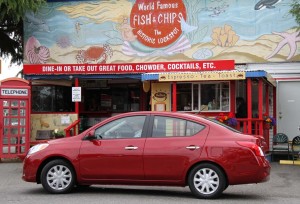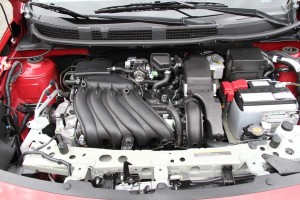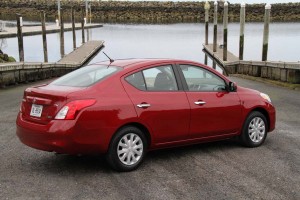With a starting price of just $10,990, the 2012 remake of the Nissan Versa sedan will clearly catch the attention of those on a tight budget. And in this economy, there are a lot of folks who qualify. Stealing a march on its Korean rivals, the Japanese maker’s smallest 4-door actually comes in significantly cheaper than comparably equipped offerings from Hyundai and Kia.
Anyone familiar with the Nissan Versa nameplate knows that has long been a big selling point – but a low cost often has its price, the prior generation requiring buyers to accept significant sacrifices in terms of room, performance and creature comforts.
The good news is that the all-new 2012 Nissan Versa sedan no longer demands such concessions. Based on the Japanese maker’s new global V platform, the latest iteration proves unexpectedly roomy, far better equipped and is a lot more fun to drive. It also gets significantly better fuel economy, though it does not meet the magic 40 mpg highway target that some key competitors are unabashedly promoting at every opportunity.
There will be two Versas for 2012, buyers need note. The hatchback, which has traditional accounted for almost two-thirds of Nissan’s subcompact sales, won’t get a re-make for another year. The big news for the upcoming model-year is the redesign of the sedan.
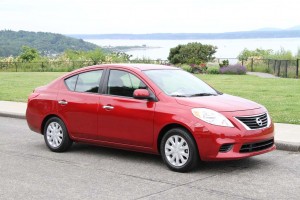
Shorter overall, the 2012 Nissan Versa has a longer rear overhang, which means more rear room and segment-leading cargo space.
The outgoing 4-door was typical of older Japanese designs: tall, narrow and awkward looking. The new model gets a more svelte appearance as its overall length shrinks about 0.6 inches, to 175.4 inches, with the height dropping more than an inch. It’s broader of beam and, thanks to an increase in the rear overhang, there’s a surprising amount of additional room available for back seat passengers and in the trunk – which now holds 14.8 cubic feet, making it the segment leader.
Indeed, during a day of driving in and around Seattle, we found it more than comfortable to sit in the back, even with a driving partner of 6-feet-and-some up front.
Even at the entry price of $10,990, you’ll no longer get the ultimate, stripped-down econobox. The 2012 Versa sedan 1.6 S offers air conditioning, a 5-speed manual gearbox, a six-way adjustable driver’s seat, and an AM/FM/CD audio system.
You can push the car up towards $16,000 if you go for the top-line SL and tick every possible box on the option list, but you don’t need to go there for a reasonably well-equipped model. To Nissan’s credit, they have refocused on value with Versa, even offering an optional base navigation system at less than $400, which might actually convince many buyers to go with the built-in device rather than opting for an aftermarket navi.
All models of the 2012 Nissan Versa sedan come with a new 1.6-liter direct-injected inline-four engine. That’s down from 1.8 liters on the old car and, in an unexpected twist, the output dips from 122 horsepower and 107 lb-ft of torque (the latter down from 122 lb-ft with the old car). That might seem a surprise considering the seemingly endless push to always raise power from generation to generation. But, in practical terms, anyone who isn’t fixated by the numbers won’t even notice.
The new engine has to power a lighter car, for one thing, Nissan accomplishing a 150-pound weight reduction despite significant increases in content for comfort and regulatory reasons. The new engine is much more high-tech, using twin fuel injectors and twin CVTC, a technology borrowed from the bigger, sportier Maxima. Meanwhile, other than on the base car, Nissan goes with a newly-updated version of its continuously variable transmission, or CVT.
Now, to be honest, CVTs may be impressive on paper, but they haven’t thrilled many a reviewer’s heart. They’re normally quite busy as they whir and buzz to find the right ratio for maximum mileage. They have a tendency to “rubber band,” which means they force the engine to rev to peak RPMs while the rest of the car catches up.
But the new Nissan CVT adopts a sort of hybrid design. That doesn’t mean a battery drive, but the incorporation of an accessory planetary gear set normally found in a conventional transmission. As a result, it gives the effective gear range of a 7-speed automatic, but in operation it is much less noisy, much more responsive.
And fuel efficient. For 2012 the Nissan Versa gets an extra 5 mpg, a significant bump, to 30 mpg city, 38 highway and 33 combined, according to the EPA. The downside is that it doesn’t hit 40, like the new Hyundai Accent. The Korean maker is heavily promoting its “4×40” strategy, having taken pains to get four models up and over that fuel economy break point.
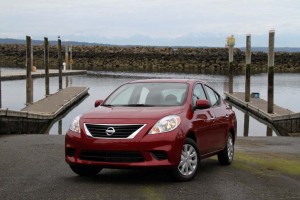
Price will still be a big selling point for Nissan's smallest model, but even the base car will deliver features like air conditioning.
In practical application, Nissan officials insist, the difference adds up to perhaps $36 a year in what a typical motorist will spend to drive 15,000 miles compared to Accent. And the difference would be more than offset with many competing models if a buyer spent the extra money for “eco” upgrades on products like the Chevrolet Cruze or Ford Fiesta, contend Nissan officials.
(Check out the new 2012 Hyundai Accent. Click Here for the review.)
On the road, the new Versa is no pocket rocket, but despite the small engine it is acceptably quick, as we learned to our satisfaction having to negotiate multi-lane changes on the crowded freeways of Seattle. There’s relatively little body roll and sway under normal driving conditions.
The seating is comfortable, there’s reasonable storage space, and despite one notable flaw in interior fit-and-finish (which we’re promised is an early prototype problem that should vanish by retail production launch) the new Versa has climbed a long way out of the econobox ghetto.
That’s good news because a surprising number of American motorists are downsizing and are willing to pay to get an attractive, comfortable and well-equipped minicar rather than the bigger gas-guzzlers they’re used to. At the same time, the base Versa should win over motorists who could opt for a “nearly new” used vehicle but really want something just off the line.
Nissan is expecting the 2012 remake to increase demand for the sedan body style. And we’d expect many folks to migrate over from the older hatchback. For those who really want the 5-door versatility the wait won’t be long, at least.
The 2012 Nissan Versa, following on the roll-out of the new Hyundai Accent, underscores the increasing competitiveness of the subcompact segment. That’s a win for anyone looking for a big deal in a small car.

